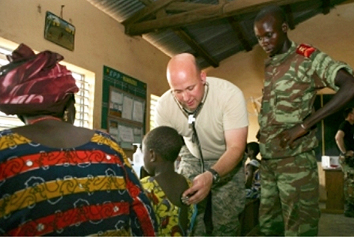| Welcome  In June, the Military Health System recognizes Men's Health Month. It's an opportune time for us all to focus on protecting and enhancing our health. In our military we're trained to take charge. I cannot over-emphasize the importance for us all to do just that: what we have been trained to do and what we know to be best for our own well-being. In June, the Military Health System recognizes Men's Health Month. It's an opportune time for us all to focus on protecting and enhancing our health. In our military we're trained to take charge. I cannot over-emphasize the importance for us all to do just that: what we have been trained to do and what we know to be best for our own well-being.
Health includes not only physical fitness but much more. Sustaining good health means engaging in regular exercise, preventing injuries, eating well, managing weight and eliminating tobacco use. In short, sustaining healthy lifestyles. Alcohol-related tragedies across the force remain a huge concern. If you use alcohol, do so responsibly and in moderation and never get behind the wheel when you have been drinking—any wheel: car, truck, tactical vehicle, motorcycle or motor boat. And certainly never combine alcohol with medications, whether prescription or over-the-counter products. We are a nation at war, and the significance of sound, resilient emotional and spiritual health has been driven home to us all. We have seen many suffer from the pain of war, families destabilized, and professional abilities compromised. Fortunately, the Military Health System and our service leaders have recognized and responded to this with compassion and an increasing array of programs, behavioral health providers, training and outreach. Those not directly in the fight can also take advantage of many of these initiatives. So take responsibility for your own good health and remember that the best way to keep our military healthy is to prevent things that can harm it and to extend our help to those in need. Enjoy this issue of MHS Vital Signs! BG Timothy K. Adams
Commander
U.S. Army Public Health Command (Provisional) June Is Men’s Health Month  To be a good warrior, husband or father, one needs to stay strong, which means staying healthy. To help with that, the MHS recognizes June as Men’s Health Month and has established a webpage dedicated to men’s health resources. Throughout the month, health.mil will highlight men’s health issues, raise awareness of preventable health problems, and encourage early detection and treatment of diseases. Blogs will discuss heart health, fitness and smoking cessation. The MHS has also created Father’s Day e-cards. Remind the men in your life how important their health is by sending them an e-card today. Read more New DoD Policy Outlines Military Health Support in Global Stability Missions  A new Department of Defense policy signed May 11 directs the Military Health System to prepare to establish and maintain the health sector capacity and capability of other countries when the local population, international or U.S. civilian agencies cannot do so. The policy also directs the Military Health System to support and collaborate closely with other U.S. departments, foreign governments and security forces, nongovernmental and regional organizations in global stability missions. Improving local medical capacity can in turn help stabilize governments and produce healthier populations. Read more Answering the Call: The DoD-USPHS Mental Health Initiative  This month’s issue of MHS Profiles looks at two U.S. Public Health Service Commissioned Corps officers supporting the Department of Defense and the USPHS Mental Health Initiative. This unique partnership provides service members and their families with increased access to mental health providers—like those profiled in this story—whenever and wherever their duty calls. Read more Warrior Care Spotlight: Warrior Games Closing Marks New Beginning  The 2010 Warrior Games may have ended, but for the wounded warriors who competed in Colorado Springs, Colo., their work is just beginning, officials hope. “You’ve just completed a rigorous test of your physical and mental skills, your strength and endurance,” Chairman of the Joint Chiefs of Staff Navy Adm. Mike Mullen told the athletes in a video message aired during the closing ceremony. “But now is no time to rest. I’d like you to take what you’ve done here, what you’ve learned here and continue to serve as role models for others striving to find the independence they need.” Read more, visit our blog or check out these videos from the Warrior Games about sitting volleyball, wheelchair basketball and track and field events. Neurology Residents Score Highest in Nation  Neurology residents at Wilford Hall Medical Center on Lackland Air Force Base, Texas, are scoring among the highest of all residency programs in the United States. "During the past two years, our residents scored in the 98th percentile on their residency in-service training exams. This year they scored in the 100th percentile," said Lt. Col. (Dr.) Patrick Grogan, the neurology department program director. "This is the first time we've had such high scores over three consecutive years." The 59th Medical Wing's neurology residency program is a three-year program, with two new residents entering the program each year, totaling six residents being trained at any given time. New residents are preselected after a one-year internal medicine internship. Read more Research Roundup  Research, medical publications and articles from peer-reviewed medical and scientific journals are a vital part of the Military Health System. Each month, MHS Vital Signs highlights notable research being conducted by the MHS and its counterparts. Bar Codes Used to Track Surgical Instruments  A research project at the 81st Medical Group Hospital on Keesler Air Force Base, Miss., sponsored by the Office of the Air Force Surgeon General, uses automated identification and data collection applications to improve clinical and business processes. AIDC includes technologies such as radiofrequency identification, ultrasound, bar codes and infrared that allows an item to be identified nearby, in the case of bar codes, or at a distance, using RFID. A proof-of-concept recently started in the hospital's central sterile supply. It involves surgical tray and instrument tracking under the guidance of Capt. Yvonne Hill, 81st Surgical Operations Squadron. It uses bar codes that are electrochemically etched into the stainless steel surgical instruments. The bar codes uniquely identify each instrument as well as its type and are linked to information in the system database. Read more Did You Know?  TRICARE’s new, T3 managed care contracts have been awarded. Once a transition to T3 occurs, the basic contract structure remains the same as under the current contracts. Military hospitals and clinics are at the center of our health care delivery system. They continue to be the first choice for patient care and will be fully supported by our contractors. TRICARE’s new, T3 managed care contracts have been awarded. Once a transition to T3 occurs, the basic contract structure remains the same as under the current contracts. Military hospitals and clinics are at the center of our health care delivery system. They continue to be the first choice for patient care and will be fully supported by our contractors.
The three benefit options—TRICARE Prime, TRICARE Extra and TRICARE Standard—have not changed. TRICARE Prime and Extra, the plans that offer preferred networks, will still be available in the areas surrounding existing military treatment facilities and BRAC-designated areas. The T3 contracts will continue to manage provider networks, referrals, enrollment, claims processing and customer service. They provide access to data and reward beneficiary satisfaction, quality, and customer-friendly programs. Read more Recently on the Dot Mil Docs Podcast  Dot Mil Docs 111: Combat Stress Dot Mil Docs 111: Combat Stress
Victoria Bruner, director for Clinical Education and Training at the Deployment Health Clinical Center, discusses clinical support for combat stress syndromes, misperceptions about combat-related post-traumatic stress, and her visit to Fort Hood in the aftermath of the tragedy there in November.
Dot Mil Docs 112: Service Dogs
Ellen Bloom, chief of mental health for Madigan Healthcare System's Warrior Transition Battalion, discusses the physiological and mental benefits that service dogs offer. Dot Mil Docs 113: Mental Health Services and JTFCapMed
Lt. Col. Rebecca Porter of Joint Task Force National Capital Region Medical discusses mental health resources that are available through JTF CapMed. Dot Mil Docs 114: Virtual Worlds Technology for Psychological Health
Kevin M. Holloway, PhD, a clinical psychologist at the National Center for Telehealth and Technology, discusses virtual worlds technology as a potential new way for post-combat service members to access psychological health care. IN and OUT: Comings and Goings in the MHS  IN:  Army Col. Jamie B. Grimes will serve as the National Director of the Defense and Veterans Brain Injury Center effective July 1.
OUT:  Air Force Col. Jay Burks will be leaving his position as OASD (HA) Chief of Staff to join McGuire Air Force Base as Medical Group Commander. Air Force Col. Jay Burks will be leaving his position as OASD (HA) Chief of Staff to join McGuire Air Force Base as Medical Group Commander.
 Dr. Sonja V. Batton will be leaving her position as Deputy Director at the Defense Centers of Excellence for Psychological Health and Traumatic Brain Injury. Dr. Sonja V. Batton will be leaving her position as Deputy Director at the Defense Centers of Excellence for Psychological Health and Traumatic Brain Injury.
The Military Health System (MHS) is a unique partnership of medical educators, medical researchers, and health care providers and their support personnel worldwide. The MHS is prepared to respond anytime, anywhere with comprehensive medical capability to military operations, natural disasters and humanitarian crises around the globe, and to ensure delivery of world-class health care to all DoD service members, retirees, and their families. To subscribe, unsubscribe, or manage your e-mail subscription options, including your preference for text or HTML formatted e-mails, click here. |